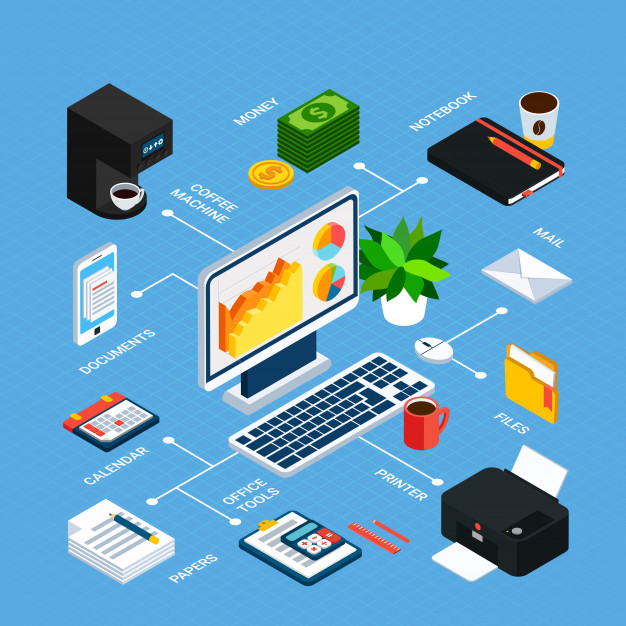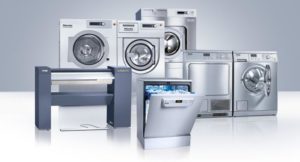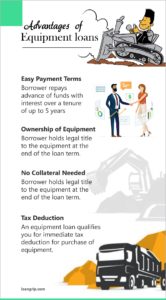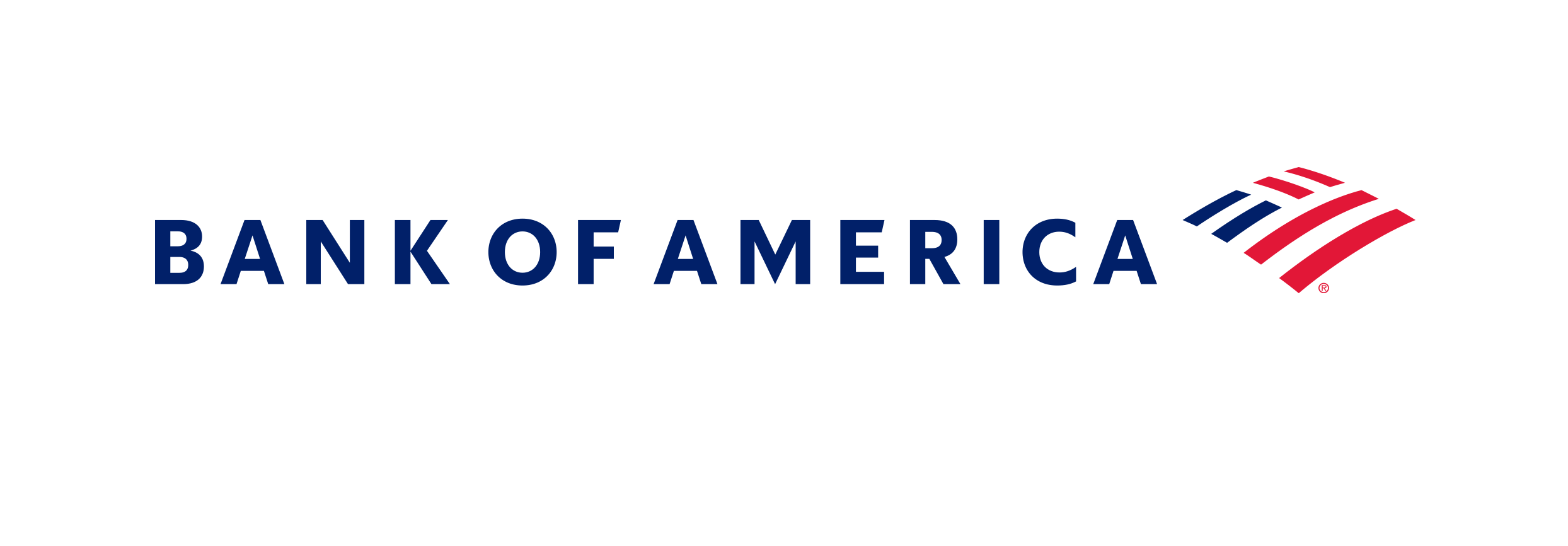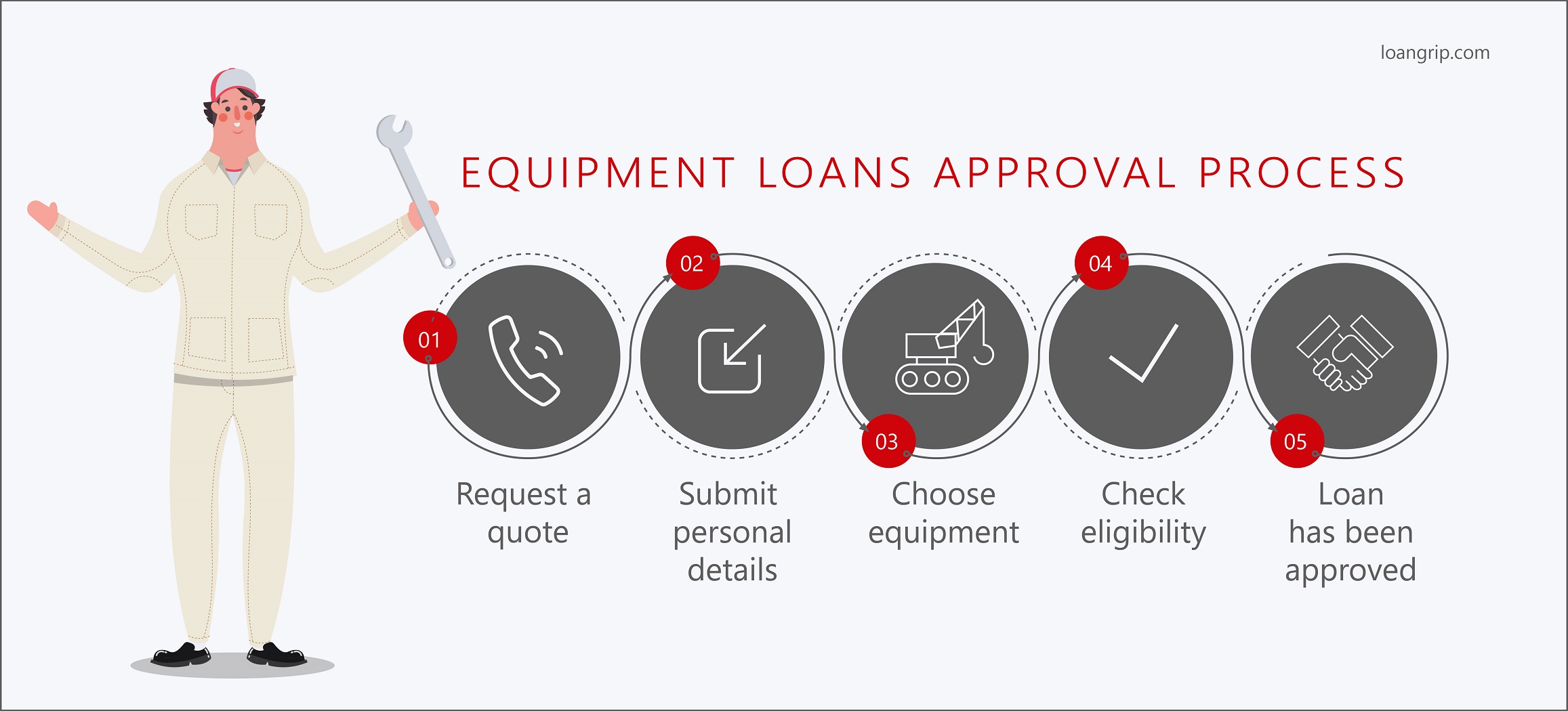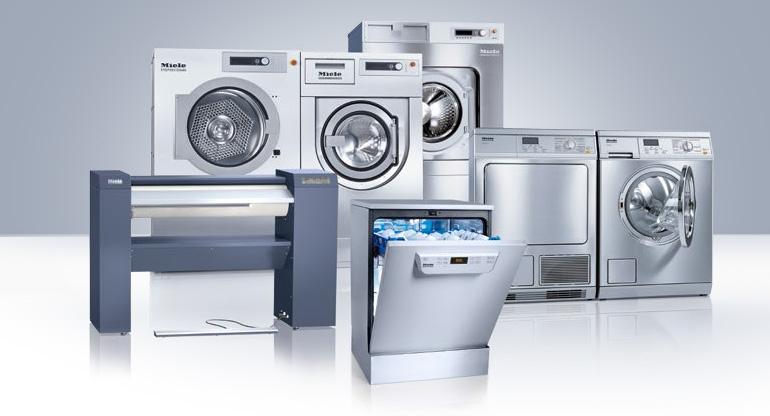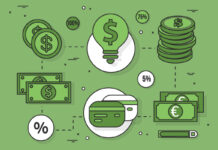Today you’re going to see the best type of equipment loans for startup businesses in 2020.
In this comprehensive guide I’ll cover:
- What is equipment financing,
- What is the interest rate on an equipment loan,
- How to calculate the interest rate on an equipment loan,
- How to get a loan for equipment,
- And lots more
Let’s get started.
What is Equipment Financing?
Equipment financing is a method of funding equipment for your business by getting an equipment loan.
Oftentimes when running a business you may need to purchase new equipment or have to upgrade to better equipment for better processing and production to facilitate the startup.
For instance:
A startup laundry company that needs to purchase a modern industrial washing machine that will make their services stand out among their competitors.
As a startup, it’ll be quite difficult to afford to pay for this equipment and still pay for their shop rent. This is where equipment financing comes in handy!
The startup can choose to finance the purchase by going for an equipment loan from traditional lenders such as banks or other non-traditional lenders.
DID YOU KNOW: Some equipment loans can also last up to 10 years? Share on XApart from equipment loans, there are other ways to acquire equipment for your business without having to pay cash straight away; some of which include:
- Equipment leasing
- Making purchases via credit card
- Angel investing
- Invoice financing
Funding the purchase of equipment from your business working capital may disrupt your business cash flow system and leave you with insufficient funds for other business expenses.
Benefits of Equipment Loans for Startup Businesses
Business equipment are often very expensive – running even into thousands of dollars; And for a startup or small business, this can be quite inconvenient;
Often times your capital may not even be sufficient for such purchase, this is where equipment financing comes into play. Equipment loan takes off the strain that removing such a huge amount from your business may cause and instead – stretches it over a longer period.
Equipment loans are easier to get than regular business loans!
Also, with equipment loans, as long as you have all the basic requirements ready, your loan request can be processed as short as two business working days.
This is because the underwriting process is less rigid, and also the requirements and terms are more flexible, and often times lenders are satisfied with taking the equipment purchased alone as collateral.
This means if you don’t meet up with the terms of payment, the equipment could be reacquired by the lender.
Equipment loans are even more suitable for startups because it is less risky to both the lender who has the equipment as collateral and the borrower who does not stand to lose personal assets as would be the case with other types of business loans.
Flexibility
The process involved in getting an equipment loan is more flexible and can even be processed online without having any physical contact.
Equipment financing using equipment loans also have flexible payment schedules. Lenders offer different payment terms, and you can inquire from them to find which one works best for your business.
Tax-Deductible
Here’s the good news, equipment loans are tax-deductible as operating expenses.
This means that interest which is now higher than if you had bought the equipment and made a one-off payment can be subtracted when making tax returns, thus increasing your business’s net revenue.
You can consult your tax attorney to know more of the tax benefits you stand to gain with the loan term being offered to you by a lender.
Depreciation
The value of a piece of equipment depreciates over its useful life. This depreciation can be a small reduction in tax and can be deducted over the useful life of the equipment.
Covers Soft Costs
Soft costs involved in the purchase of equipment like freight cost, cost of transportation, etc. can be covered by the lender. This can be beneficial for your business depending on its type and the lender.
You will need an equipment loan when:
- You need to purchase new equipment
- You need to upgrade your equipment for expansion and competition
- Repairs are no longer financially advisable
- To acquire equipment permanently instead of a lease
The success or failure therein of your business may depend on getting an equipment loan and the terms of the loan.
How Does Equipment Loan Work?
The rate and terms of the equipment loans depend on the following:
- Lender
- Loan period
- Market condition
- And how much you qualify to the criteria of the loan
The interest rate on equipment loans is between 2- 20% of the acquired loan… And the payment of interests is based on a monthly, quarterly, annual, or biannual basis, depending on the terms of the lender.
Occasionally, a certain percentage of the cost of the equipment may be required as a down payment – often up to 25%!
Not all equipment loans cover the whole cost of the equipment. Share on XThat is…
For a business owner trying to purchase a piece of equipment for his business, there are actually equipment loans that can help fund a certain percentage of the total cost of the equipment.
For example, let’s say the equipment you wish to purchase for your business costs $300, your equipment loan can actually pay for 70% ($210) of the cost of the equipment, leaving you with just $90 to pay.
This kind of equipment loan usually attracts a lesser interest rate.
Where Can I Get an Equipment Loan?
When it comes down to financing equipment for small businesses, there are so many options while using an equipment loan.
One of the best options is actually the bank that you have your business account attached to.
Some other options include:
#1: Traditional/National lenders
Traditional lenders refer to banks and national lenders include organizations such as Wells Fargo and the Bank of America.
They generally have more rigid underwriting requirements but offer better rates and terms.
For business startups, it might be difficult to get financing for equipment from traditional banks as a business cash flow statement of up to two years is often a major requirement.
But still, there’s no harm in giving them a try!
Traditional/national lenders are the best options when it comes to getting the cheapest interest rates and longer terms on equipment loans.
In some cases with traditional banks, you might need additional collateral apart from your equipment for the loan.
#2: Non-Traditional Lenders
These are private loan organizations that offer more flexible terms than traditional banks to small business owners.
Most non-traditional lenders can be found online!
They are not too strict with their requirements, but they often request higher interest rates and shorter loan terms. Some even request a certain percentage of your business future credit card clearance as interest.
Some popular non-traditional lenders that offer equipment financing for small business owners include:
How to Get an Equipment Loan for Your Business?
The equipment loan approval process involves…
Some of the common things a lender will require from you before considering financing your equipment purchase include:
1. Creditworthiness
This is one thing that every lender always reviews before considering approving an equipment loan request.
Your personal credit score is often considered because as a new business, especially a startup, your business hasn’t developed enough to have a credit history… And most times, you need to have a perfect credit score to get the loan to finance your business equipment.
Things like a default in a student loan, mortgages, late car payments, and the likes can give you a bad credit score rating and hinder the approval of your equipment loan.
The lender also needs to be sure that you are in a good position financially to make your loan payments – and a prior bankruptcy on file will give your credit a bad look.
2. Business Plan
A comprehensive business plan is definitely one criterion that you need to pay attention to when applying for your next equipment loan.
A good working business plan will show lenders the potential of the future growth of your business.
This is one tool you can use to convince them that giving you a loan to finance equipment for your business will help to expand and upgrade your business. It doesn’t have to be a long and bulky business plan, just something to show them where you are coming from and where you are headed.
You can let them know the services you offer and how your customer demographic looks like.
Endeavor to include the number of years you’ve been in business and the annual revenue in your business plan. You can also summarize the realistic goal you have set out for your business.
3. Cash Flow Statement
This is also an important requirement by lenders to determine the worthiness of your business for the loan.
Your business cash flow statement is a financial report that shows the revenue and expenses your business is generating.
Note that, if your business is running at a loss – it’ll be reflected in your cash flow statement.
Sometimes, your personal financial report may also be required by lenders, since your personal financial habits go a long way in determining your business growth.
If you haven’t already, be advised to hire the services of a certified accountant who will prepare a clean and ethical financial statement with a high level of integrity.
Also, it would be a smart thing to get your business and personal finances in order!
4. Personal Resume
It’s also important to have a well-prepared personal resume to show to lenders, just in case they ask.
This is important especially for startups – your personal resume will help both traditional and non-traditional lenders see your personal traits.
In your Resume, highlight those skills and experiences you have that will promote the possibility of the success of your business. This will show lenders that you are up to the task and will be able to meet up with the loan payments.
Calculating Equipment Loan Terms and Interest Rates
As discussed earlier, equipment loan terms and interest rates are determined by the following:
- How long you have been in business,
- Your credit score,
- The amount you are seeking for
Equipment Loan Amount
Equipment loan amounts vary widely from industry to industry – it can range from a few thousand dollars to up to $5,000,000.
The amount you can borrow depends on:
- The type of equipment you’re financing,
- Are you financing used equipment or one that is totally new,
- The useful life of the equipment.
Most lenders specialize in industry-specific equipment loans and can offer you the best deals.
Depending on the lender and factors like your credit score, you may be able to fund up to 100% of your equipment cost.
Equipment Interest Rate
The interest rate on an equipment loan generally varies from 2% to 20% and depends largely on your credit score, business revenue, how long you’ve been in business, the state of the equipment and a down payment.
The equipment cost also affects the interest rate as less expensive equipment tend to have higher rates.
A low credit score often attracts higher interest rates!
The equipment can be taken as collateral especially for heavier equipment that has a longer useful life. Otherwise, a down payment may be required.
Equipment Loan Term
Equipment loan terms depend on:
- The loan option,
- Equipment,
- And lender.
An equipment loan term generally does not surpass the useful life of the equipment.
Equipment loans can last between 1 to 10-year term or more, giving more time for heavier industrial equipment.
Remember to inquire about – up-front costs a lender may charge when a loan is funded… This is also known as the origination fee.
This will help you calculate the total cost of the equipment loan.
Conclusion
The bottom line is that – as far as your business requires the use of equipment for its smooth running, at some point you will need the help of an equipment loan. Be sure to prepare all the documents required to make the process easier for you.
The secret to reducing your equipment loan cost is by having an excellent credit score!
You can improve your credit score by making payments on time, and automating payments scheduling them will help you achieve this.
Now I’d like to hear from you:
Have you tried to use equipment loans to finance equipment purchases for your business?
If so, how did it go?
Let me know by leaving a comment below right now.
Frequently Asked Questions (FAQs)
What is Equipment Financing?
Equipment financing is a method of funding equipment for your business by getting an equipment loan.
Oftentimes when running a business you may need to purchase new equipment or have to upgrade to better equipment for better processing and production to facilitate the startup.
For instance:
A startup laundry company that needs to purchase a modern industrial washing machine that will make their services stand out among their competitors.
As a startup, it’ll be quite difficult to afford to pay for this equipment and still pay for their shop rent. This is where equipment financing comes in handy!
The startup can choose to finance the purchase by going for an equipment loan from traditional lenders such as banks or other non-traditional lenders.
How to Get a Loan for equipment
When it comes down to getting a loan for equipment for small businesses, there are so many options.
One of the best options is actually the bank that you have your business account attached to.
Some other options include:
#1: Traditional/National lenders
Traditional lenders refer to banks and national lenders include organizations such as Wells Fargo and the Bank of America.
They generally have more rigid underwriting requirements but offer better rates and terms.
For business startups, it might be difficult to get financing for equipment from traditional banks as a business cash flow statement of up to two years is often a major requirement.
But still, there’s no harm in giving them a try!
Traditional/national lenders are the best options when it comes to getting the cheapest interest rates and longer terms on equipment loans.
In some cases with traditional banks, you might need additional collateral apart from your equipment for the loan.
#2: Non-Traditional Lenders
These are private loan organizations that offer more flexible terms than traditional banks to small business owners.
Most non-traditional lenders can be found online!
They are not too strict with their requirements, but they often request higher interest rates and shorter loan terms. Some even request a certain percentage of your business future credit card clearance as interest.
Some popular non-traditional lenders that offer equipment financing for small business owners include:
What is the Interest Rate on an Equipment Loan?
The interest rate on an equipment loan is between 2- 20% of the acquired loan… And the payment of interests is based on a monthly, quarterly, annual, or biannual basis, depending on the terms of the lender.
Occasionally, a certain percentage of the cost of the equipment may be required as a down payment – often up to 25%!
For a business owner trying to purchase a piece of equipment for his business, there are actually equipment loans that can help fund a certain percentage of the total cost of the equipment.
For example, let’s say the equipment you wish to purchase for your business costs $300, your equipment loan can actually pay for 70% ($210) of the cost of the equipment, leaving you with just $90 to pay.
This kind of equipment loan usually attracts a lesser interest rate.
How to Calculate the Interest Rate on an Equipment Loan?
The interest rate on an equipment loan generally varies from 2% to 20% and depends largely on your credit score, business revenue, how long you’ve been in business, the state of the equipment, and down payment.
The equipment cost also affects the interest rate as less expensive equipment tend to have higher rates.
A low credit score often attracts higher interest rates!
The equipment can be taken as collateral especially for heavier equipment that has a longer useful life. Otherwise, a down payment may be required.

